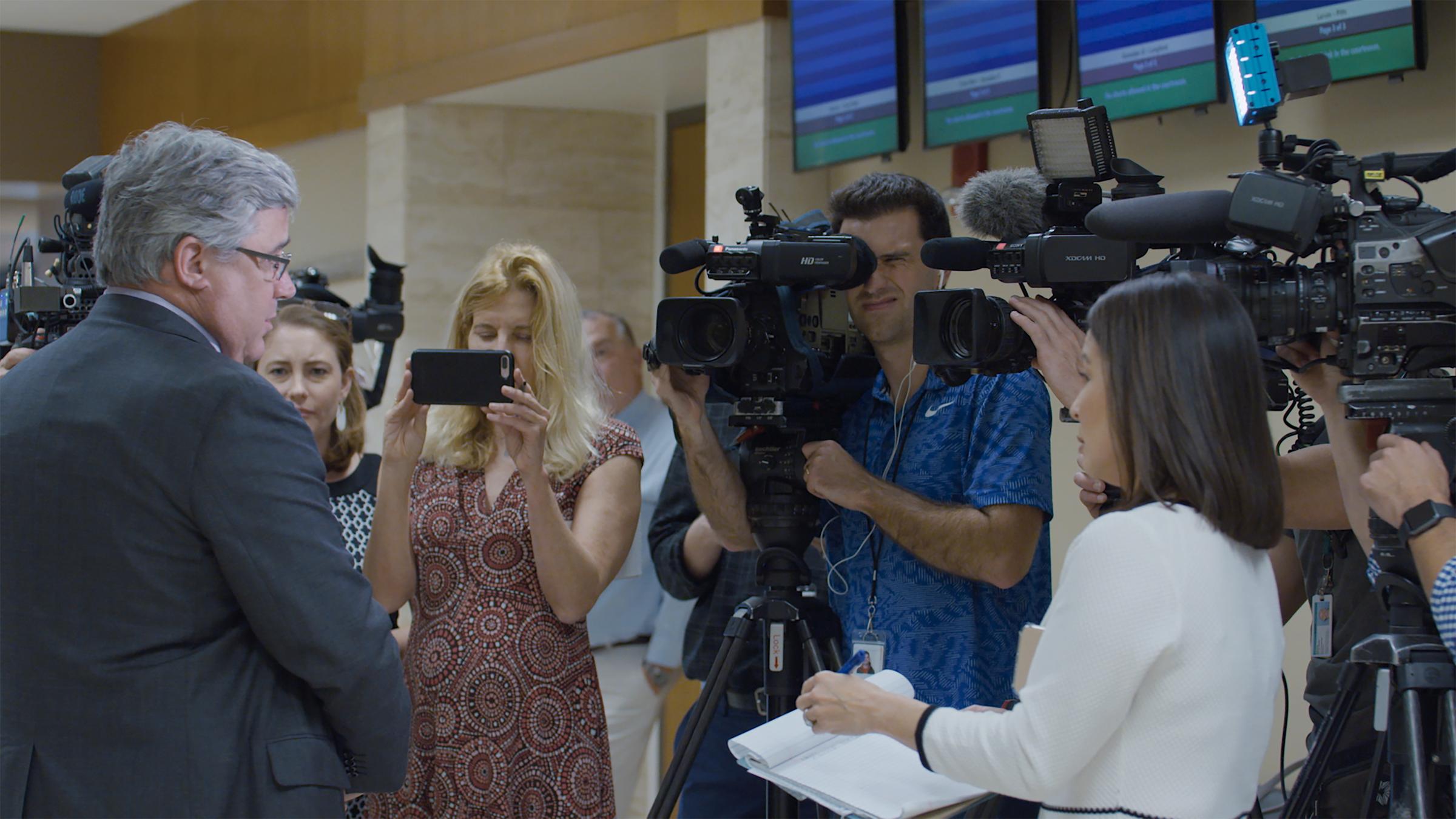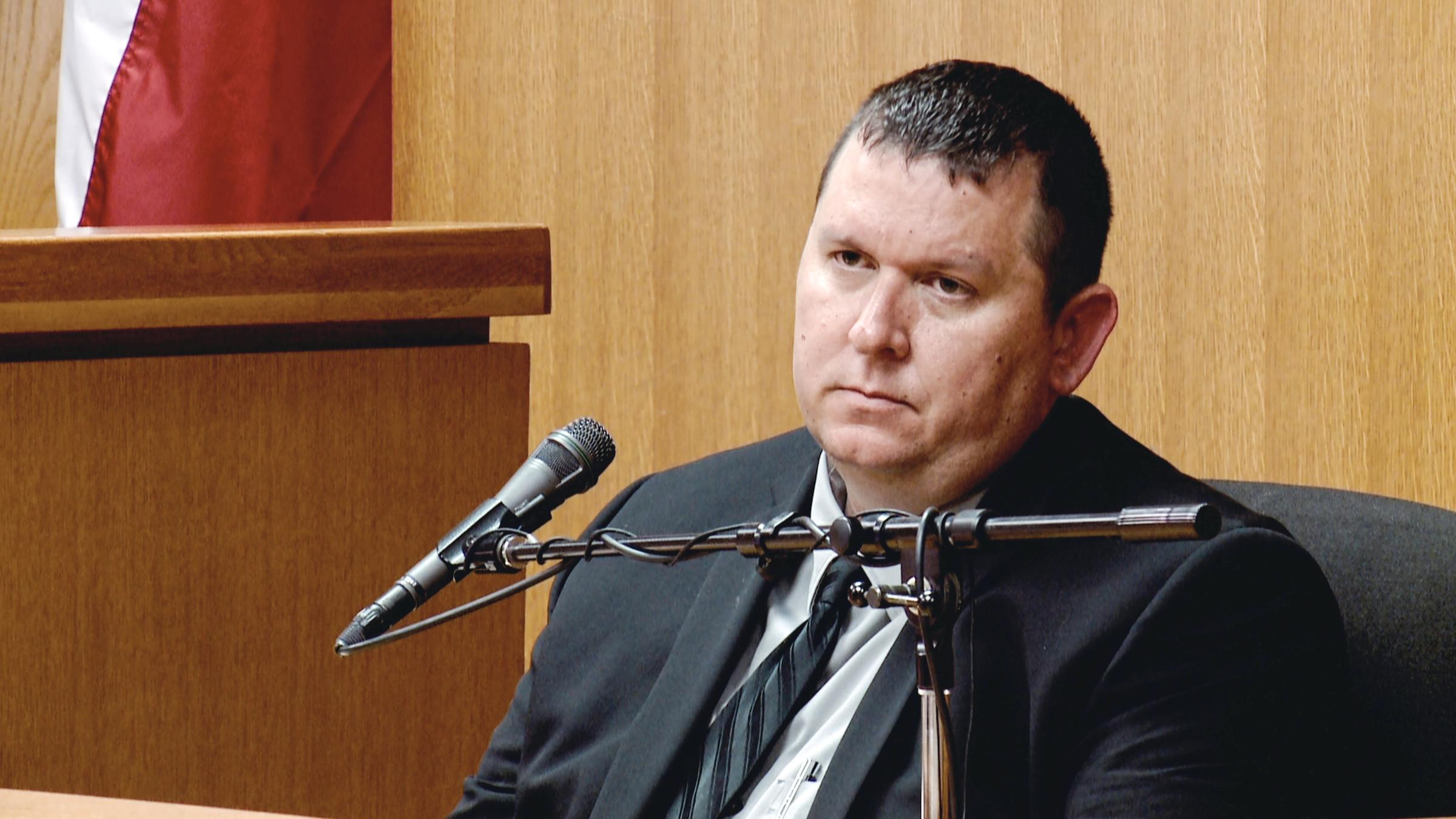Spoiler warning: this piece discusses events from all five episodes of Showtime’s Outcry.
When Greg Kelley finished his junior year of high school, in 2013, his future looked brilliant. A football star in Leander, Texas—one of those Friday Night Lights towns that obsess over their local team to an extent that verges on unhealthy—Kelley had verbally committed to continuing his career at the University of Texas at San Antonio, where he was expected to get a full scholarship. He was already several years into a committed relationship with a talented dancer, Gaebri Anderson. And though both of his parents had been hospitalized with health issues that resulted in him moving in with his friend Johnathan McCarty’s family, Kelley seemed well on his way to an adult life filled with love and success. An NFL career didn’t seem out of the question, either.
But before his senior year even began, Kelley saw his reputation destroyed and his dreams put on indefinite hold. As filmmaker Pat Kondelis’ (Disgraced, The Scheme) timely and haunting, if far from perfect, Showtime docuseries Outcry recounts, the police in nearby Cedar Park arrested the football hero that summer and charged him with the super aggravated sexual assault of two 4-year-old boys at the daycare McCarty’s mother operated out of her home. Convicted in 2014, after he’d refused a plea deal and one accuser had recanted, Kelley was sentenced to 25 years without the possibility of parole. Still, he insisted on his innocence. Family, friends, Anderson and many classmates stood by him. And a movement coalesced around freeing him, led by a sympathetic stranger named Jake Brydon, who also helped to finance new legal representation for Kelley.
Outcry, which will air on Sundays through August 2 but is already available to watch in full on Showtime’s streaming apps, looks like a sort of social Rorschach test at first. Do you trust Kelley—whose initial support surely had much to do with his status as Leander High’s golden boy as well as the community’s refusal to accept that it might have venerated a predator? Do you believe his accusers, as a local victim advocate interviewed for the series does, despite the fact that one of the boys later denied that any abuse happened, not to mention everything psychologists know about the fallibility of testimony from very young kids? (Kondelis reminds us of the notorious 1980s McMartin trials, in which faulty interviews with child accusers resulted in charges that the operators of a California preschool raped their young students as part of wild Satanic rituals.) Or do you acknowledge the very real, very frightening possibility that we may never know beyond a reasonable doubt who did what, if anything, to either of the two children?
While these questions alone might have been enough to fuel a five-part miniseries, the outcome of Kelley’s six-year ordeal leads Kondelis to an even weightier query—one that has never been more urgent than it is now, with Americans’ faith in law enforcement at an all-time low: What does the criminal justice system owe to the people whom it flagrantly, demonstrably fails?
And fail Greg Kelley it did. Through extensive footage of the appellate process and interviews with the attorney who handled his appeal, Keith Hampton, viewers come to understand just how catastrophically the original case was mismanaged. A compelling alternate suspect—Kelley’s lookalike buddy McCarty, who later served time following several rape accusations—was overlooked amid a glaring conflict of interest: the lawyer Kelley trusted to defend him during his first trial turned out to have had a long history of representing the McCarty family. Even more astonishing is the reckless single-mindedness and apparent malice with which the Cedar Park Police Department’s lead investigator on the case, Chris Dailey, pursued Kelley’s conviction. (The emergence, during the appellate process, of a Texas Ranger who argued that evidence of Kelley visiting porn sites on his smartphone supported the conclusion that he was a child molester adds a new layer of absurdity.)

Kondelis sticks close to the Kelley camp, and in doing so, he makes the same tradeoffs that Jean-Xavier de Lestrade made in his influential true-crime docuseries The Staircase, for which the filmmaker eventually spent the better part of two decades following Michael Peterson, an author charged with killing his wife, and his defense team. Like that show, Outcry establishes enough intimacy with the accused to capture the agony of seemingly endless criminal proceedings, the pain of dreams indefinitely deferred, the emotional toll such ordeals can take on families that stay loyal to men they’re convinced are innocent. At the same time, both directors fail to gain the trust of the opposing side. Though Kondelis gestures vaguely at the intensity of the football rivalry between Leander and Cedar Grove in the premiere, he never gets close enough to Dailey to flesh out a motive for what Hampton frames as the detective’s “bad faith” investigation. The show also seems hesitant to provide much background on Brydon, who devoted so much effort to defending a man he only met after helping to secure Kelley’s release.

Although he was still in jail when Kondelis began filming, it’s the back half of Outcry, which follows him post-incarceration, that feels most profound (even if the director’s efforts to avoid “spoiling” big developments make the timeline of those later episodes a bit confusing). Kelley walks free after a district judge agrees to a $50,000 bond in August 2017; four months later, she recommends he be found innocent, as “the state would not have been able to prove him guilty beyond a reasonable doubt and a reasonable jury would be obliged to declare him not guilty.” Yet he remains stuck in a holding pattern for more than two years after his release, waiting for the Texas Court of Criminal Appeals to either exonerate him or haul him back into custody.
During that time, Kelley, now well into his 20s, tries to push forward. He goes back into training, eager to apply for a second shot at UT but conscious that the clock is ticking on his football career. He and Gaebri get engaged and move together to New York, where she’s pursuing her education in dance. Yet, as Kondelis’ cameras observe, every Wednesday morning finds Kelley anxiously refreshing the CCA’s website to see if his name is on the list of cases that have been resolved. Hampton confirms that such a long silence from the state is incredibly rare. Only in late 2019 does Kelley learn that he’s been exonerated. By then, as his mom Rosa Kelley recounts through tears at a fractious Cedar Park City Council meeting, his father has died.
It seems clear that a healthy criminal justice system wouldn’t make mistakes of this magnitude—ones compounded over and over again by the failures of prosecutors, defense lawyers, Texas Rangers and especially local police. But assuming it did so spectacularly fail a person, Outcry finally asks, how would a healthy criminal justice system make amends? No one can restore to Kelley the six years of youth that he lost, or go back in time and ensure that his dad lived to see him clear his name. Local governments and professional colleagues could, however, punish the individuals whose corruption, incompetence and conflicts of interest exacerbated Kelley’s ordeal. Unfortunately, that hasn’t happened; Dailey remains on active duty in Cedar Park, while Sean Mannix, the police chief who defended the detective’s handling of the investigation, retired by choice in early 2020 and the attorneys on both sides of the original case have seen their careers advance in the intervening years.
“All I wanted was a handshake, an apology and accountability,” Kelley has claimed. But none of the above was forthcoming. And in May, he filed a wrongful conviction lawsuit against the city of Cedar Park and both officers. Like his exoneration, any satisfaction he finds in civil court will be too little, too late—not a vindication of a justice system that will have finally done right by Kelley but an indictment of one that took so much from him, gave so little back and still insisted it had done nothing wrong.
More Must-Reads from TIME
- Cybersecurity Experts Are Sounding the Alarm on DOGE
- Meet the 2025 Women of the Year
- The Harsh Truth About Disability Inclusion
- Why Do More Young Adults Have Cancer?
- Colman Domingo Leads With Radical Love
- How to Get Better at Doing Things Alone
- Michelle Zauner Stares Down the Darkness
Contact us at letters@time.com